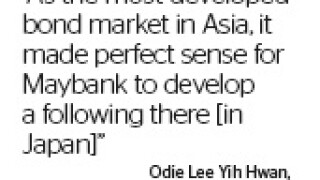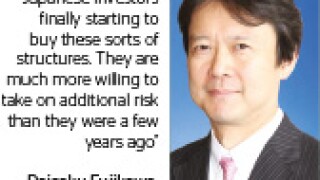Japan
-
Goldman Sachs and Sumitomo Mitsui Trust Bank are set to start marketing SumitG, a bond backed by a portfolio of RMBS, but secured by claims against both institutions. Goldman will be hoping to avoid the fate of last year's Figsco issue, a note with a similar structure which never made it to market. Bill Thornhill reports.
-
Japan Post sets sail with IPOs — Datang Environment files in HK — Banpu Power eyes Thai float — Larsen & Toubro seeks $300m listing
-
An Asian issuer could be about to make its second visit to the socially responsible bond market, with its green offering appearing to have undergone a slight rebranding exercise.
-
The Japan Post group has announced price ranges for the long-awaited IPOs of its three units, set to collectively raise ¥1.44tr ($12.03bn) to become the biggest offering this century in the country.
-
The socially responsible investor base is growing nicely, as is its diversity in terms of geography and types. But growth could be about to hit warp speed as governments and regulators wake up to the sector. Craig McGlashan reports.
-
The year 2015 has seen important progress in the field of green bond investment in Asia, with the emergence of two big new markets — China and India. For its Tokyo roundtable, GlobalCapital invited a panel of issuers, investors, analysts and bankers to discuss the trends in the sector and the potential for development as new markets open up for the asset class across the region.
-
Mizuho Bank has raised Bt3bn ($83m) from its debut in the Thai bond market, with the deal also marking the first offering under a new pan-Asian initiative designed to streamline debt issuance. The trade received a robust response from investors, and is expected to pave the way for other similar transactions.
-
Maybank became the first Asia Pacific issuer to launch a Pro-Bond in May 2014. It was the bank’s first foray into the Japanese capital markets, and also represented a useful shot in the arm for the fledgling Pro-Bond initiative. Maybank has since graduated to a Samurai, allowing a useful comparison between the two markets.
-
Korean banks have pulled back from the Samurai market, as funding costs have moved against them, but some other names have stepped into the breach. Australian banks are a key fixture in the Samurai markets, while the arrival of Maybank this year gives a pointer to future issuance. Asia Pacific financial institutions issuers are also proving instrumental in the steady development of the Pro-Bond market. Volatility in China, however, is not helping anybody. In September, some of Asia Pacific’s leadering FIG borrowers spoke to GlobalCapital about prospects in the Japanese capital markets.
-
Japan’s corporate bond issuers are facing razor-thin pricing in their domestic market, able to get away with thinner spreads than they have pulled off for years. But the new spread environment has not made everyone happy — and bond volumes have tumbled as a result. Matthew Thomas reports.
-
An evolution is happening in emerging market issuers’ use of yen funding. For many years, many of them have only been able to issue Samurai bonds by using JBIC’s GATE (Guarantee and Acquisition toward Tokyo market Enhancement) programme, but steadily more of them are stepping up to standalone issuance. At the same time, benchmark borrowers are bringing along less established issuers from the same countries in their wake
-
Japan’s debt market is not often known for its structural diversity, but a smattering of bank capital deals over the past year-and-a-half have provided a rare treat for yield-starved investors. There is little reason, though, to think supply will approach the level local investors would like for a long time to come. Matthew Thomas reports.









